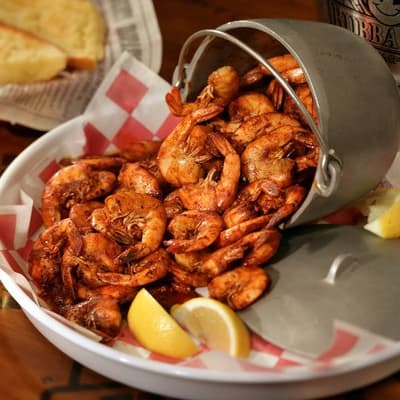-
(#1) McDonald's Has Had A Cornucopia Of Fake Meat Controversies
McDonald's is like the Yankees of fast food restaurants. And everyone wants to beat the Yankees. The company's ubiquity has led to a slew of PR nightmares, not the least of which were pink slime allegations, which accused McDonald's, along with various other companies, of using lean beef trimmings, a rubbery, pink substance produced by whipping beef trimmings (bits left over after the good cuts of meat have been removed from a cow's carcass) around in a centrifuge to remove fat and gristle.
The company has also come under fire for its chicken nuggets. Some claim they're the chicken equivalent of pink beef slime, others say there's no way something so cheap can be pure meat. McDonald's "debunked" myths about its nuggets in a video of their production, though as Lindsay Abrams points out in Salon, the video skips a key part of this process:
"Skipping straight to the processing plant also allows the video to ignore what should be the most controversial ingredient: growth-promoting antibiotics. Routine use of the drugs is standard practice for many of the United States’ major poultry producers, a recent Reuters investigation revealed, contributing to the growing crisis of antibiotic resistance. Tyson is no exception — according to the documents uncovered by Reuters, ordered an antibiotic 'for use in the prevention of coccidiosis in broiler flocks, growth promotion and feed efficiency.'"
Despite the bad press, by addressing the public's questions and creating seemingly honest videos, McDonald's persevered through these controversies. Rebranding efforts initiated in 2015 have the chain leaning towards a more upscale, minimalist vibe by tapping into local trends, with new menu items including guacamole burgers and breakfast bowls.
-
(#8) Whitbread
- Hospitality, Leisure
In January 2017, UK restaurant chain Whitbread was caught in a questionable meat scandal when it was caught selling a dish called beef lasagne that contained pork. The mislabeling was disconcerting for Jews and Muslims, whose religion forbids eating pork.
Whitbread representatives claim the menu item was supposed to read "meat lasange" after change in the recipe included the addition of 4.5% pork, more than a third of the total meat contained in the dish. Representatives insisted this was an honest mistake. The company has since changed the label, but a company whistleblower stated he had alerted management as to the problem months prior to it going public.
-
(#9) Wendy's
- Restaurant, Fast food
In June 2014, the Los Angeles Times ran an article entitled "Is there wood pulp in your burger or taco?," in which it was explained how Wendy's, Taco Bell, McDonald's, and Carl's Junoir use trick semantics with ingredients lists. According to the article, cellulose, a common ingredient in products from all those restaurants, is a food additive made of tiny pieces of wood pulp and plant fiber. Burger King uses it in buns, tortillas, tacos, onion rings, mozzarella sticks, and pancakes, among other items, and at Wendy's, you can find it in shakes, cheese shreds and cheese crumbles.
McDonald's loves cellulose the most, using it in shredded cheese, fish fillet patty, biscuit, sausage and scrambled egg mix, smoothie base, syrup, ice cream, barbecue sauce, sweet 'n' sour sauce and honey mustard sauce. According to the FDA, cellulose is safe for consumption in certain instances, but generally cannot be digested by humans, and is therefore does your system no good.
-
(#2) Jack in the Box
- Restaurant
In 1993, a Jack in the Box E. coli outbreak in the Pacific Northwest affected close to 400 customers over a period of a few months. A February 6, 1993 article from the New York Times paints a grim picture:
"The 60 Jack in the Box restaurants in the state have been barraged by anonymous telephone callers accusing them of being baby killers. Customers are scarce. And local newspapers have carried advertisements by lawyers offering to represent poisoning victims."
The outbreak was lethal: Four people died from eating Jack in the Box or coming in contact with someone who did. It was a nightmare for the company, which blamed its supplier and slaughterhouse. Inconsistencies with government oversight of the fast food industry may have contributed to the outbreak, as state and federal laws differed on cooking temperature for meat. Some good came of the tragedy, as new regulations were put in place, to preventing it from happening again
-
(#5) Taco Bell
- Restaurant, Fast food
Ah, the halcyon days of 2011. The deaths of Steve Jobs, Osama Bin Laden, King Jong-il, Muammar Gaddafi. The Tōhoku earthquake and tsunami. The Taco Bell scandal. Remember that one?
In that year, Alabama law firm Beasley Allen filed a lawsuit against the Tex-Mex food chain, accusing the corporation of lying about its meat. According to the suit, Taco Bell taco meat was only 35% beef, which isn't a high enough percentage to truthfully be labeled meat under USDA regulations.
Taco Bell fought back, claiming its meat was 88% beef. The company released videos (including a parody) of its production process, offered information to refute the attorney claim, and even shared a full list of ingredients for its beef, the first ingredient in which is beef (which, yay? Maybe? Shouldn't it be? Since that's what it's called?).
Still, this doesn't mean it's good for you. Associate Slate editor LV Anderson points out, "Most fast-food meat is very low quality—one study of fast-food hamburgers found that they contained connective tissue, blood vessels, peripheral nerves, adipose tissue, cartilage, and bone along with muscle tissue." Anderson suggests Taco Bell (and other fast food brands) use less meat and more filler for a healthier final product.
-
(#7) Tesco PLC
- Retail, Supermarkets and Other Grocery (except Convenience) Stores
We-do-it-all retailer Tesco began as a small grocery chain, and has since expanded to include banking services, gas stations, and telecommunications. In 2013, the chain came under fire when several of its burgers where found to contain horse meat, which is illegal in the UK.
At first, the scandal was mostly speculation. Tesco representatives refuted the claim that its frozen Everyday Value Beef Burgers contained a significant amount of horse meat. However, DNA tests showed some packages of the brand's microwave Everyday Value Spaghetti Bolognese contained 60% horse meat. The company reacted quickly, pulling the product and others from its shelves, but the damage was already done. Tesco has encountered its fair share of scandals over the years, but the brand lives on.
New Random Displays Display All By Ranking
About This Tool
Fast food is the fastest growing industry nowadays, and it is also the industry that has suffered the most criticism and caused the most disputes. Regarding food safety issues, many world-renowned fast food chain brands have caused controversy and received penalties in their development history. For example, McDonald’s, as the world’s largest fast food chain brand, used ammonia-treated beef, and announced in 2012 that would stop using the pink fake meat in the United States.
The random tool lists 9 well-known international fast food chain brands that have sold expired meat or fake meat, or at least questionable meat. Nowadays, more people pay attention to food safety issues, and relevant food safety supervision departments are becoming more stringent.
Our data comes from Ranker, If you want to participate in the ranking of items displayed on this page, please click here.
















